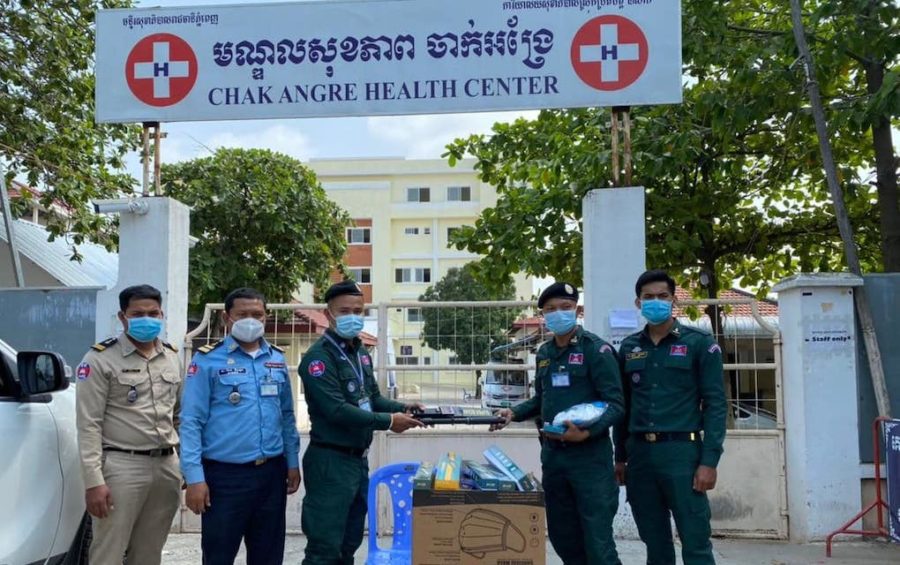Just over 100 people were arrested and fined in Phnom Penh in one day as authorities introduced canes for beating lockdown violators, a police official said on Wednesday.
Asked about the canes, which have been seen in some videos posted to social media, Phnom Penh Municipal Police spokesperson San Sokseyha said some people in Phnom Penh’s “red zones” had been uncooperative.
“Some people in the red zones don’t listen, so the police have used that measure,” Sokseyha said.
But Cambodian authorities were still lenient compared to some countries, he said.
“We don’t want to implement it. The important thing is they participate together to prevent the infections. If they do not participate, it will be impossible with authorities’ efforts alone,” he said.
Sokseyha added that 101 people had been arrested for lockdown violations in Phnom Penh on Tuesday alone, but they were immediately handed a fine and freed. Ninety-five were in Daun Penh district and six in Russei Keo, he said. The fines were for gathering in parks and driving around without proper documents, he said.
Since April 15, six people have been sentenced to jail, 11 were facing court proceedings, and two were being questioned by police for more serious lockdown violations, Sokseyha said, without specifying the offenses.
“In red zones, which are facing the greatest challenges in terms of the outbreak, we’ve started to strongly tighten up [enforcement] in order to make them participate in reducing and stopping the outbreak,” he said.
Local-level authorities also spoke of stricter enforcement.
Yos Yuthy, Daun Penh district deputy governor, said his officers had been rounding up people sitting around or exercising in parks, or taking their motorbikes for a ride.
“We collected them to make them learn the lesson,” Yuthy said.
Officers patrolled Monivong Boulevard, Norodom Boulevard and around Central Market, also known as Phsar Thmey. People are being stopped and asked for permission letters or whether they are out to buy food, he said.
“If we don’t tighten up, there will be difficulty the next day because we can’t see the infections [spreading],” he said.
Daun Penh had yet to bring in canes to beat violators, Yuthy said, but added that they had been introduced in nearby Prampi Makara district.
Prampi Makara district governor Lim Sophea could not be reached for comment.
Kuy Phalla, Mittapheap commune police chief in Prampi Makara, denied that officers had beat anyone, though they patrolled the park near the Council of Ministers building to stop people from exercising.
“We just chased them. No beatings,” Phalla said.
However, a TikTok video posted on Wednesday caught two authorities swinging police batons while chasing a man in front of the Council of Ministers building.
Keo Sakal, first deputy commune chief in the same district’s Veal Vong, said strict action could not be avoided, but violators were still just being educated.
“We are worried because some people are not afraid,” Sakal said. Eighty people in her commune, mostly from Borei Keila, had tested positive for Covid-19, with about 1,000 families including some living in rental rooms of particular concern, she said.
“For good people, they will be happy because it is preventing the pandemic. But for those who are against us, they will say it is not good.”
Phnom Penh governor Khuong Sreng acknowledged that some force was being used to enforce the public health measures in red zones.
Sreng said it was necessary for police to use canes to stop people from walking around and spreading the virus.
Soeng Senkaruna, spokesperson for human rights group Adhoc, discouraged authorities from using force. Instead, they should look into what livelihood problems people might be facing, he said.
Phnom Penh and Kandal province’s Takhmao city have been put under lockdown amid the country’s worst Covid-19 outbreak to date. The country is nearing 5,000 active cases after 303 more were announced on Wednesday.
The capital has designated several red zones with the worst coronavirus clusters, where people are not allowed to leave their homes even to buy food.
Additional reporting by Khan Leakhena













